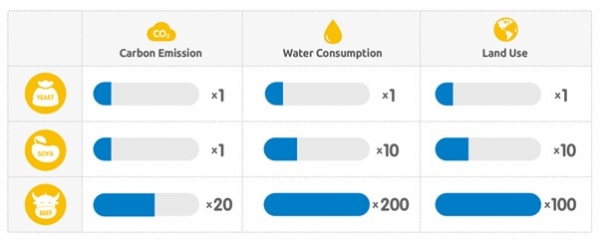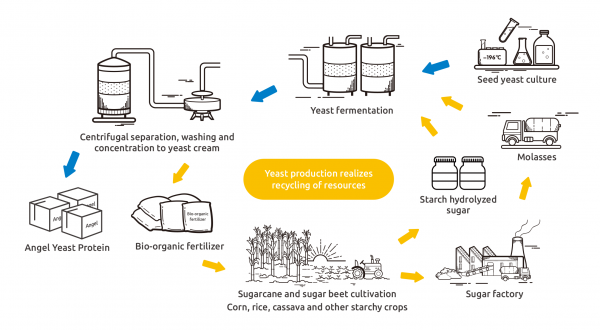Promotional Features
Angel Yeast Protein is nutritional and sustainable game-changer
Leading yeast extract manufacturer, Angel Yeast, strives to close the protein gap with its sustainable, environmentally-friendly and nutritious solution, Angel Yeast Protein.
Global yeast and yeast extract manufacturer, Angel Yeast, is the first enterprise to embark upon modern yeast production in China and is currently Asia’s largest yeast producer. Developed by Angel Human Health (AHH) Division, an arm of Angel Yeast specialising in yeast and fermentation, Angel Yeast Protein is a sustainable, eco-conscious and nutritious food option to support the needs of people and the planet.
Yeast: A safe, sought-after and sustainable choice
For centuries, food, beverage and personal care manufacturers have consistently relied upon yeast, otherwise known as Saccharomyces cerevisiae, to enhance their products’ texture, stability and nutritional values.
Protein consumption is crucial to overall human health and is required for growth and repair. Proteins are made from amino acids, which are found virtually everywhere in the human body. However, not all amino acids can be synthesised internally. Therefore, yeast protein production is highly sought-after to provide nutritional value and enable people to obtain sufficient amounts of protein from their diets.
Consumers are increasingly seeking multifunctional food and beverage products. Therefore, brands and manufacturers must opt for effective and appealing ingredients and new product development that reflect today’s shoppers’ health, environmental, physiological and emotional needs.
The yeast protein industry in 2022
Protein is a major nutrient, and demand for it is increasing amid the growing global population, rising living standards and shifting eating habits. The global population is expected to reach 9.7 billion people by 2050, with two-thirds of people anticipated to live in urban areas, the United Nations reports.
The projected rise in population and rapidly changing eating habits creates a substantial protein gap between the amount of protein that is available and the predicted demand that is required to feed almost 10 billion people.
In recent years, between 2017 and 2022, the global protein market has grown by 5.3%. Supplements, baking confections, protein bars and beverages are prominent product categories in the protein space.
In the US and Canada, over 80% of consumers opt for protein products to improve their overall health. Over 50% of shoppers are looking for options that enable them to eat clean and around a fifth (over 20% in Canada and 10% in the US) choose protein products based on their eco-friendly nature.
Yeast protein over animal or plant
Overall, the global per capita demand and annual global demand for animal and plant protein are on course to rise considerably between the 1960s and 2030s. However, high-quality yeast protein varieties are increasingly formidable in the market, appealing to health and sustainability-conscious consumers seeking an alternative to animal or plant proteins. Increasingly, consumers are lowering their meat consumption and other animal products, labelling themselves as vegans, vegetarians or flexitarians, the Nielsen Global Health and Ingredient Sentiment Survey 2016 revealed.
As today’s consumers are turning away from animal protein, they are looking for alternative sources to fulfil their needs. Health concerns, animal welfare, environmental sustainability, food shortages, and worries about infectious diseases, ingesting antibiotics residues and the presence of hormones all impact consumers’ protein choice.
Plant proteins are the main alternative to animal protein in today’s market, with proteins such as wheat, soy and pea growing in popularity. However, plant proteins also raise concerns for consumers, brands and growers alike due to the limited amount of land available globally to grow plants on.
Ground failure, soil erosion, soil salinisation, desertification and land pollution also detrimentally affect the land that is needed to grow plant proteins. Growers also face the unavoidable impacts of climate and environmental influences that lead to unstable pricing and output. The low nutritional value, pesticide residues and risk of genetically modified organisms (GMOs) also impact consumers’ decision to avoid plant proteins.
Overcoming two core challenges
The rising global population and consumer move towards sustainable alternatives to animal and plant proteins has led the food, beverage and nutrition industry to face two major challenges:
- How to find a solution that meets the protein needs of nearly ten billion people in an affordable, sustainable and healthy way?
- How to compensate for the loss in animal protein intake with other protein sources?
Angel Yeast sought to solve this dilemma by researching and developing a protein source that is affordable, sustainable, eco-friendly and as nutritious as animal protein.
Eco-friendly, sustainable and carbon-reducing yeast protein production
Angel Yeast explored the environmental influence and resource consumption of its Angel Yeast Protein. Compared to both animal and plant protein, yeast protein can significantly reduce water consumption, occupy less cultivated land and generate less carbon footprint.
The yeast industry adopts a circular economy model. Yeast production successfully involves recycling resources, with a complete production lifecycle maximising sustainability and minimising waste.
Environmental influence and resource consumption when producing equal amount of protein
The nutrient sources of yeast are sugarcane and beet molasses, and starch hydrolyzed sugar as a supplementary source. These nutrients are collected and then processed in a sugar factory to create molasses. Seed yeast culture is then combined with the molasses to ferment the yeast before embarking on centrifugal separation, washing and concentration to produce yeast cream. The resulting yeast cream is then used to produce Angel Yeast Protein. The industrial wastewater of yeast production uses organic fertilisers for crop production.
Circular economy of producing process of Angel Yeast Protein
With Angel Yeast Protein, the company hopes to improve sustainability and close the global protein gap amid the immediate need to produce sustainable, environmentally friendly and nutritious food.
A protein market game-changer, Angel Yeast Protein
Angel Yeast Protein contains numerous health claims. The yeast product is a non-GMO and non-animal nutritional product, suitable for vegans, vegetarians and flexitarians. The supplement is also gluten-free, soy-free, dairy-free, allergen-free and lactose-free. Angel Yeast Protein is free from anti-nutritional factors such as protease inhibitors and phytates as well as pesticides, antibiotics and hormones. The clean-label product appeals to health-conscious consumers who are looking for health-focused products.
Angel Yeast Protein is a complete protein that contains all nine essential amino acids. A reliable, eco-friendly and sustainable nutritional product, yeast proteins like Angel Yeast Protein provide the best substitute for plant and animal proteins. With Angel Yeast Protein, there is no risk of GMOs or other animal protein concerns.
The yeast protein has a high branched-chain amino acid (BCAA) content, which is good for muscle recovery. Angel Yeast Protein also has high dietary fibre content, providing good benefits for gut health. It is a slow protein, enabling Angel Yeast Protein to provide the body with amino acids, continuously and steadily.
Compared to animal and plant protein sources with long breeding cycles, Angel Yeast Protein is extracted from the yeast with short production cycles and high efficiency.
The nutritional game-changer has many applications in foods that supply good quality protein, including dairy products, protein beverages, snack foods, pastries, smoothies, dietary supplements, protein powders, energy bars, protein bars and meal replacement powders.
The scientific case for yeast protein
In a recent research study published in February 2022 in the Journal of Functional Foods, scientists examined the impact of yeast protein supplementation on muscle ageing.
The first-of-its-kind study to investigate the effects of yeast protein as a supplement, entitled Muscle ageing amelioration by yeast protein supplementation was associated with gut microbiota, set out to explore the potential association between yeast protein (Saccharomyces cerevisiae) supplementation, gut microbiota and skeletal muscle ageing.
Nineteen-month-old mice were given one gramme of yeast protein for three months. During this time, the researchers found histological and ultrasonographical improvements in muscle, along with an increase in myofiber size after yeast protein supplementation.
Yeast protein was found to activate a specific pathway, known as Akt/mTOR/4E-BP1, and regulate myogenic regulatory factors to promote muscle protein synthesis and muscle regeneration and differentiation.
The researchers saw how alterations in the abundance of gut microbiota after yeast protein supplementation significantly correlated with glycan biosynthesis and metabolism, amino acid metabolism and lipid metabolism, which are closely connected to the muscle ageing process. The presence of yeast protein supplementation in the mice changed microbial richness, composition and diversity.
- Key insights
The study revealed that yeast protein supplementation provided an ameliorating role in muscle ageing, which may be linked to gut microbiota.
As a result, the researchers suggested that yeast protein could be a promising and effective supplement that may play an ameliorating role in muscle ageing.
Supporting yeast protein research
Researchers examined microbial, animal and plant proteins in a research study entitled Amino Acid Composition Analysis and in Vitro Dynamic Digestion of Proteins from Three Different Sources.
Published in April 2019, the study sought to better understand the nutritional properties of yeast protein concentrate, whey protein and soy protein isolate. The researchers also strived to ascertain the amino acid composition and in vitro digestion and absorption of the three proteins to compare and contrast their characteristics.
Examining the three proteins as raw materials, the study’s research team analysed their amino acid composition and compared them using an amino acid analyser. The researchers also observed the proteins’ digestibility and absorption rates, comparing these to a human intestinal microbial ecosystem simulator.
The amino acid analysis results indicated that all three proteins contained eight amino acids, necessary for the human body. The composition ratio was similar to the Food and Agriculture Organization (FAO) of the United Nations and the World Health Organisation (WHO).
Fermented yeast protein obtained after processing and concentration of the parent was rich in complete essential amino acids. The in vitro digestion experiment demonstrates that the protein content is approximately 70% rich in these amino acids.
- Key insights
The study’s results showed that yeast protein is a slow-digesting protein, which is helpful to anti-metabolism and muscle protection. Slow-digesting proteins can provide a stable flow of amino acids to prevent muscle tissue breakdown.
Also, the researchers found that the amino acids contained in yeast protein have characteristics that are unmatched by general vegetable proteins. Yeast protein can increase satiety and continuously and steadily provide amino acids, thus providing a good protein source.
The potential of Angel Yeast Protein
Angel Yeast Protein is a sustainable, environmentally friendly and nutritious food substance that provides an effective protein source and contributes to closing the protein gap.
Sources:
- Liao Y et al., 2022. Muscle ageing amelioration by yeast protein supplementation was associated with gut microbiota. Journal of Functional Foods.
- Zhixian C et al., 2019. Amino Acid Composition Analysis and in Vitro Dynamic Digestion of Proteins from Three Different Sources. Journal of Henan University of Technology(Natural Science Edition). Vol. 40 (2)







